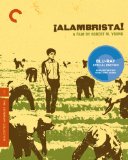| Reviews & Columns |
|
Reviews DVD TV on DVD Blu-ray 4K UHD International DVDs In Theaters Reviews by Studio Video Games Features Collector Series DVDs Easter Egg Database Interviews DVD Talk Radio Feature Articles Columns Anime Talk DVD Savant Horror DVDs The M.O.D. Squad Art House HD Talk Silent DVD
|
DVD Talk Forum |
|
|
| Resources |
|
DVD Price Search Customer Service #'s RCE Info Links |
|
Columns
|
|
|
¡Alambrista!
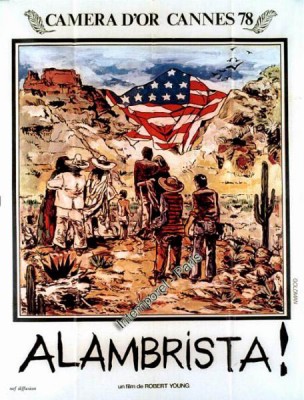
Please Note: The images used here are taken from promotional materials, not the Blu-ray edition under review.
I've never been entirely convinced that the kind of stubbornly purist realism propounded and practiced by the late John Cassavetes is as pure and effective as the often great, sometimes crackpot Mr. Cassavetes seemed to believe; it's touching but naïve, it seems to me, to believe that a filmmaker can directly capture raw "truth" or "reality" through the innately subjective, unavoidably mediating device of the movie camera. But as Robert M. Young's loose, raw, rigorously realist 1977 dramatic film ¡Alambrista! demonstrates, the insistence upon eliminating artifice and going for what's "real" has its important place when it's an approach thoughtfully pursued by a conscientious filmmaker. As Young shows (and, obeying a cardinal rule of good cinematic fiction, almost never "tells") us the story of one illegal Mexican migrant worker's journey to the U.S., it becomes clear that his adopting of a Cassavetes-esque strategy suffers from no illusions about unattainable objectivity: it's in its radical subjectivity, its ability to get us up close, as nearly inside an individual's reality as possible, that ¡Alambrista makes its mark on us.
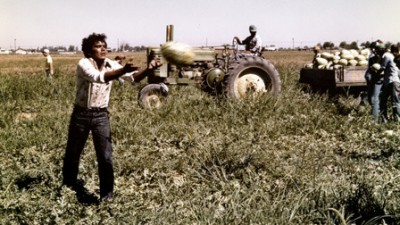
Roberto (Domingo Ambriz) is an impoverished field worker from the Southern Mexican state of Michoacan who, having just become the father of a baby girl (whose birth is virtually the first, vividly realistic and intense thing we see in the film, right away plunging us viscerally into Roberto's experience), decides to follow in his father's footsteps, leaving his family behind to take a long and difficult sojourn north to the U.S., where, unlike at home, his indefatigable hands and back can make the money they've long been at a lack of and now need more than ever. But that paternal path is treacherous: Roberto's father is essentially an abandoner, having never returned to his mother, who prays at a shrine to the Holy Virgin that her son won't become the same thing his father did, a ghostly photograph of a long-disappeared loved one for which one can do little more than light a candle. Young's handheld, 16 mm style, applied with relentless consistency throughout, makes Roberto's decision to leave, his mother's pleading, and his wife's half-trepidatious, half-hopeful acceptance all feel as inevitable as it certainly must seem to the countless migrant workers whose stories are analogous to Roberto's.
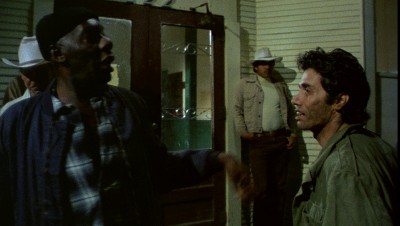
Roberto's task is a Sisyphean one in which all harsh, painstaking effort could be rendered pointless at any time, and we're there alongside him as he scrambles to evade immigration authorities; meets up with a collegial, intrepid gang of experienced fellow "fence-jumpers" (the translation of "alambrista") who try to school him in the ways of the gringo; gets dawn-to-dusk, sweat-drenched work picking strawberries (one of the remarkable things Young does is depict work being done, a representation whose total absence, all good cinematic Marxists from Godard to Mike Leigh will tell you, is how you can distinguish commercial/capitalistic entertainments from more socially-conscious ones); rides the rails in a potentially deadly way, hanging on for dear life on the bottom of the train, to the next job; meets a Stockton waitress (Linda Gillen) with whom, along with her son, he forms on off-the-cusp makeshift family, reflecting what is apparently a fairly common quasi-adulterous reality for men like Roberto who leave their families for extended periods; is spontaneously picked up and deported in an immigration raid; and gets right back up again to fall in with an organized group of illegals being brought over and up to Colorado by a callous farmer-boss (played, in a walk-on, by Ned Beatty) who refers to these struggling, slaving human beings as "bodies" and treats them like cargo. The cumulative endless, thankless work, permanent precariousness of his situation, and disregard for his humanity leads the less and less hopeful and motivated Roberto to a realization -- driven home once and for all by a final, shocking discovery in Colorado -- that makes him come full circle: as badly as he wanted to come to the U.S. and find a piece of our renowned prosperity for himself and his family, his witnessing of the grim, shamefully un-prosperous fate of the average migrant worker renders him much more desperate to return. As Roberto passes back through the border patrol, southward bound this time of his own volition, the film ends, as it began, with a birth: this time, a woman has burst free of the clutches of the immigration guards and out onto the U.S. side of the border station to cling immovably to a pillar as she gives birth so that her baby, unlike the one Roberto is returning to, will have the papers that entitle it to American opportunities undreamed of at home.
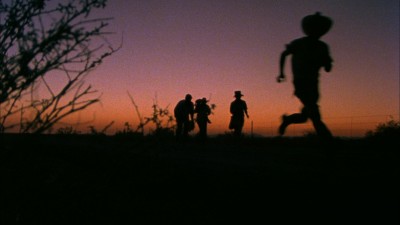
One could be forgiven for mistaking ¡Alambrista!, at virtually any point, for an actual documentary, which makes it a success on its own terms. Young's mastery of the ultra-realist, direct camera style is matched by his ability to direct actors (such as Ambriz, Beatty, and Edward James Olmos, making a brief but memorable appearance as a jaded, drunken heckler to the fresh-meat day laborers corralled on the sidewalk to be picked up by the first taker) alongside non-actors (practically every other role) and achieve in the process something that's neither professionally modulated nor purposely formal-awkward in the manner of Mametian actors or Bresson's "models," but that rare and difficult, relaxed, true naturalism of human presence in front of the camera that feels (though one knows it can't be) fully spontaneous, with all events and emotions actually happening, unpredicted and unplanned, to the people we're observing.
There is the incidental, momentary flaw here and there, the foremost among them being at the sonic level: the limited audio technology available to Young and his choice of shooting circumstances often make dialogue a bit difficult to hear, and Young's use of score and popular music sometimes just doesn't fit, interfering with his usually well-adhered-to aesthetic and momentarily altering the film into something else, something more conventional. But these are anomalous failings that merely cause ¡Alambrista! to fall short of perfection; on the whole, the film is a principled, intimate depiction of a common experience that's much talked about, debated, even shown in movies, but too seldom explored with this degree of closeness to the nitty-gritty facts, the immediate, personal-present moments of hope, fear, resignation, or wonder that comprise what the protagonists go through from day to day. Young is wise enough to know that movies can never be or truly capture reality, but more importantly, he's skilled, inspired, sincerely curious, and empathetic enough to use its realist properties to their fullest as a way of irresistibly facilitating our imagining, if only for 90 minutes, of what it actually looks, sounds, and feels like to walk in someone else's shoes.
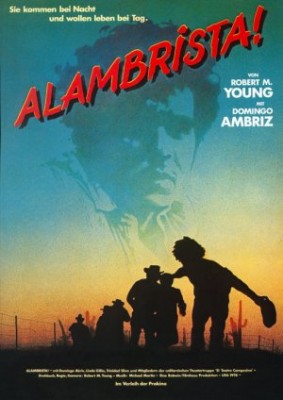
THE BLU-RAY DISC:
The AVC/MPEG-4 encoded, 1080/24p mastered transfer, which presents the film at its original aspect ratio of 1.66:1, is exemplary: by cleaning/restoring the film in a way that removes all debris, wear, and tear but retains every bit of the 16 mm celluloid-grain texture so integral to the film's roughly, rawly beautiful aesthetic, Criterion has done right by the film in a way many digital-noise-reduction-happy preparers of films for transfer to disc could take an important lesson from.
Sound:The sound of the film itself, due to the direct-cinema shooting process, makes the dialogue occasionally somewhat difficult to hear, but the uncompressed PCM 2.0 stereo soundtrack (in Spanish, with optional English subtitles) of the disc itself is faultless; care has clearly been taken to preserve the film's own original aural tone as perfectly as possible.
Extras:--An audio commentary with Young and coproducer/AD Michael Hausman, in which the longtime colleagues/collaborators reminisce on the low-budget, authenticity-seeking experience of melding documentary with fiction. This involves some fascinating explanations of principle, practice, and straight technical and logistical decision-making that's not just enlightening but also fun; it's sometimes actually amusing to re-watch the film alongside these two, who are so familiar with their material and one another that they finish each other's sentences like an old married couple.
--Children of the Fields, a 23-minute short made by Young for the Xerox Corporation in 1973 as part of their Come Over to My House series of educational films about the diverse experiences of American families. Young documents several up-before-dawn, ferociously hardworking and desperate-living (yet happy and dignified) days in the lives of the Galindos, a family of migrant workers in Arizona. This film, as explained by Young in his accompanying video interview, was the germ in his experience as a documentarian that eventually flowered into ¡Alambrista!.
--An interview with Edward James Olmos, who had one of his earliest screen roles in ¡Alambrista!. Olmos fondly and admiringly discusses his close, long-running collaboration with Young as well as his own feelings on and interpretations of Young's approach and the significance of ¡Alambrista!, both in terms of its subject and its aesthetics.
--A fold-out insert with an essay/appreciation on ¡Alambrista! by film studies professor and scholar of Latino representation Charles Ramírez Berg.
FINAL THOUGHTS:Director Robert M. Young performed an important feat of activist cinema when he made ¡Alambrista!; his particular approach of enfolding narrative into seemingly spontaneous documentation of real experience makes for the best kind of political film, one that telegraphs no message but allows the probable majority of the audience (in this case, relatively affluent North Americans) to directly experience the lives of the Other (in this case, undocumented Mexican immigrant workers). The film has a rough, unvarnished aesthetic, and the raw realism it employs as it conveys the absolutely unsentimentalized but vivid and moving journey one migrant worker takes from home and family to the strange gringo world of rural Southern California works beautifully as it keeps us simultaneously on the edge of our seats and completely immersed in the trial-riven life of someone we can't avoid understanding -- an immediacy of response to which we owe the very careful, intimate but unmanipulated way Young presents him to us. The film was made and originally released during a period in our national political history just before we started down the slippery slope that has hit bottom (one hopes) with "empathy" actually being declared a dirty word, and though ¡Alambrista! is a film whose power doesn't directly depend on topicality or current events, its reappearance in this lovingly rejuvenated Blu-ray form at our specific American moment, in the context of some particularly ugly recent political currents, makes it feel especially timely and essential. Highly Recommended.
|
| Popular Reviews |
| Sponsored Links |
|
|
| Sponsored Links |
|
|
| Release List | Reviews | Shop | Newsletter | Forum | DVD Giveaways | Blu-Ray | Advertise |
|
Copyright 2024 DVDTalk.com All Rights Reserved. Legal Info, Privacy Policy, Terms of Use,
Manage Preferences,
Your Privacy Choices | |||||||









